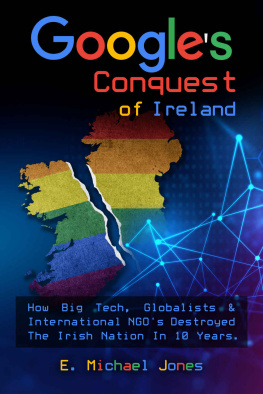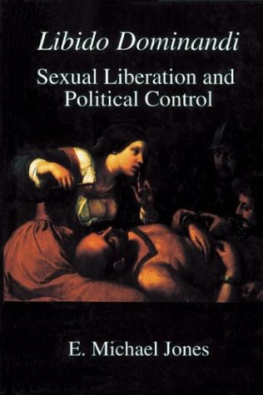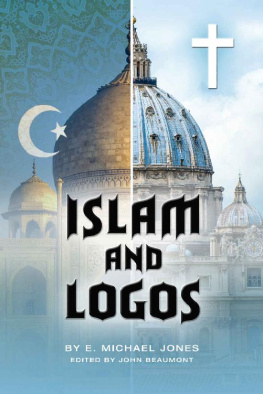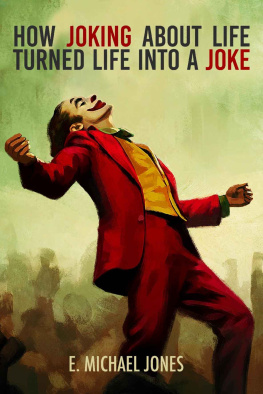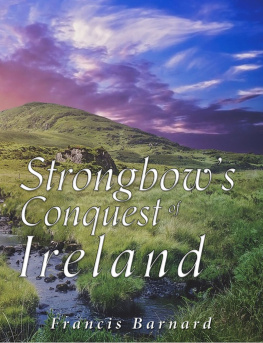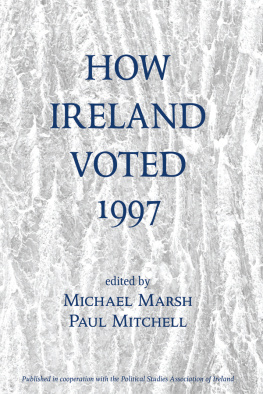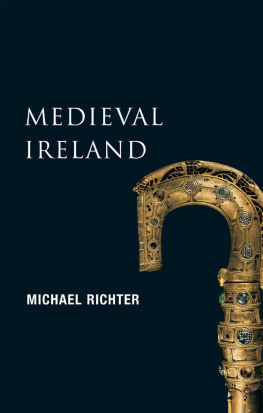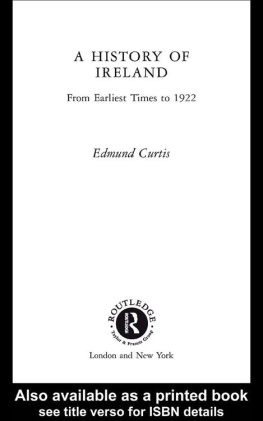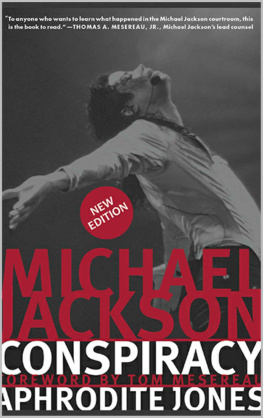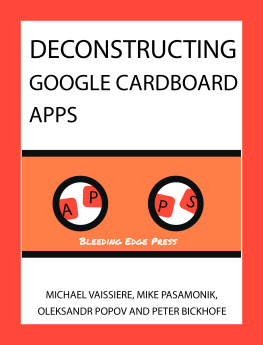E. Michael Jones - Google’s Conquest of Ireland
Here you can read online E. Michael Jones - Google’s Conquest of Ireland full text of the book (entire story) in english for free. Download pdf and epub, get meaning, cover and reviews about this ebook. year: 2020, publisher: Fidelity Press, genre: Politics. Description of the work, (preface) as well as reviews are available. Best literature library LitArk.com created for fans of good reading and offers a wide selection of genres:
Romance novel
Science fiction
Adventure
Detective
Science
History
Home and family
Prose
Art
Politics
Computer
Non-fiction
Religion
Business
Children
Humor
Choose a favorite category and find really read worthwhile books. Enjoy immersion in the world of imagination, feel the emotions of the characters or learn something new for yourself, make an fascinating discovery.
- Book:Google’s Conquest of Ireland
- Author:
- Publisher:Fidelity Press
- Genre:
- Year:2020
- Rating:5 / 5
- Favourites:Add to favourites
- Your mark:
- 100
- 1
- 2
- 3
- 4
- 5
Google’s Conquest of Ireland: summary, description and annotation
We offer to read an annotation, description, summary or preface (depends on what the author of the book "Google’s Conquest of Ireland" wrote himself). If you haven't found the necessary information about the book — write in the comments, we will try to find it.
Google’s Conquest of Ireland — read online for free the complete book (whole text) full work
Below is the text of the book, divided by pages. System saving the place of the last page read, allows you to conveniently read the book "Google’s Conquest of Ireland" online for free, without having to search again every time where you left off. Put a bookmark, and you can go to the page where you finished reading at any time.
Font size:
Interval:
Bookmark:
Googles Conquest
of Ireland
E. Michael Jones
Fidelity Press
206 Marquette Avenue
South Bend, Indiana 46617
www.culturewars.com
www.fidelitypress.org
E. Michael Jones, 2020

All rights reserved. No part of this book may be reproduced, stored in a retrieval system, or transmitted in any form or by any means, electronic, mechanical, photocopying, recording, or otherwise, without the prior permission of Fidelity Press.
Contents
After John Haldanes tight-rope walk over a swamp of politically correct crocodiles at the University of Notre Dames 2019 ethics and culture conference, John Waters talk seemed subdued by comparison. Once it got used to the somber tone of his talk, the audience quickly fell under his spell. With his balding pate surrounded by a halo of what was left of his hippie hair, his white stubble beard and cane, Waters had the air of a man who had something important to say after being released from a military infirmary where he underwent protracted convalescence following a battle in which he almost died. He described another casualty in the culture wars in Ireland, but that did not disguise the fact that he was one of that campaigns most famous victims.
On January 11, 2014, in a broadcast of The Saturday Night Show , Rory ONeill, an Irish drag queen who goes by the name of Miss Panti, moved from a discussion of the upcoming Irish referendum on gay marriage, to a discussion of homophobia, to calling the Irish journalist John Waters a homophobe in a series of logical leaps that left everyone but Waters, who was home at the time minding his own business, befuddled by the charge. After Waters obtained an out-of-court defamation settlement with RT, the Irish national broadcasting station, he was defamed by The Irish Times , the newspaper for which he had been a columnist for twenty-four years, which repeated the libel in a column by another journalist. Waters' demands for an apology and right-of-reply were rejected by the paper, and in due course he issued proceedings, at the same time resigning from the newspaper. After two years of legal prevarication, the newspaper threw in its hand and paid Waters a six figure settlement rather than allow the case go to trial. O'Neill went on to become famous and was awarded an honorary doctorate by the once illustrious Trinity College Dublin. Waters, who became a pariah after being forced out at The Irish Times , tries to explain how this could happen in a Catholic country like Ireland in his book Give Us Back the Bad Roads .
After Miss Pantis show had aired, Waters subsequently appeared on a second show. As a journalist, Waters was used to controversy, but the unmitigated venom which he encountered online after his appearance on The Saturday Night Show made it unsafe for me to walk down the street. The sense of menace he encountered was not only unprecedented in Irish society, it was especially befuddling to those who mistakenly thought that this hate campaign was being waged in the name of tolerance. The main problem was semantic. Waters was forced to defend himself against a word, homophobe, which had no correlation to the world of reality. Rather, the term homophobe was
a word with a deliberately cultivated demonic aura and a capacity to strike fear into bystanders lest they too be daubed with its nauseous meanings and innuendoes. The condition I found myself in seemed to arise almost by something like appointment of Rory ONeill, by virtue of some odd form of ordinance within his remit as a gay man. He could call me a homophobe and did not need to proffer evidence. All I could do was deny it, but I would, wouldnt I?
In his twenty years as a journalist for The Irish Times , Waters had never experienced the ferocity of what happened after his appearance on The Saturday Night Show . Waters found himself engulfed in a tsunami of outrage which made him responsible for all of the wrongs suffered by homosexuals in Ireland in living memory and before.
The impossibility of defending himself against the drag queens charge had devastating personal consequences, but the incident transcended the merely personal in its significance. Bad Roads is not so much a description of what happened to John Waters, as it is the story of what really happened to Ireland over the course of the first decade of the 21 st century. As Waters puts it:
What I had experienced and observed in the 16 months prior to the vote of May 2015 had chilled me to the marrow, and alerted me to the fragility of our democracy. In effect, a baying mob had acquired the free run of Irish societys media apparatus. The drag queen who had baselessly demonised me had, more or less as a result, become a national celebrity, himself given the run of the so-called National Theatre and of radio and TV chat shows coast to coast. In due course he would be given an honorary degree by Trinity College.
Bad Roads is the protocol of a man who woke up in the cultural equivalent of the intensive care unit after a bad accident and was now trying to piece together not only what happened to him but how the accident could have happened in the first place. How did I end up under the wheels of a homosexual juggernaut, we can imagine him saying, when I thought I was safe in my office writing columns for a newspaper?
Waters couches his book in a literary conceit, writing as if he were addressing his deceased father and the Ireland that his father represented. As part of his report, Waters, who was born in 1955, has to make some fundamental observations and clarifications. This attack could only have taken place because the Ireland he had grown up in symbolized in Bad Roads by his father, to whom the book is addressed is no longer the same Ireland as the one that celebrates drag queens by conferring honorary doctorates on them. The Ireland of Waters youth is symbolized best by his father, the inveterate tinkerer. Remembering that his father had assigned him to grind the cylinders of a second-hand automobile engine he had purchased, Waters writes that:
One of the things I unconsciously adapted from your personality was the idea of reconstructing myself to cohere with some unfocused moral paradigm for the benefit of my growing daughter. Its strange to think how easily I fell into this without thinking about it, becoming pious and solemn and serious-minded, without knowing what purpose this might serve.
Waters may have found logos in an automobile engine, but he was a reluctant conscript in the culture wars. Before his appearance on The Saturday Night Show in January 2014, Waters had no strong feelings about homosexual unions as a marriage issue. But he had very strong feelings about paternity. Because of the discrimination he had encountered after he had fathered a child out of wedlock with the Irish singer Sinead OConnor, Waters believed that fathers were systematically deprived of what should have been inalienable rights which stemmed from biology not the permission of a politician or the whims of social workers. Homosexual marriage, he feared, would further weaken whatever remaining rights fathers still had by denying that fatherhood was a biological fact and making it a lifestyle choice granted to privileged minorities.
The state trumps biology nowadays by defining who can call themselves the childs parents. Under assault from the bullying power of LGBT activists, the chronic dishonesty and abdication of journalists, the say-so of multinational corporations, and the craven self-interest of politicians, virtually the entirety of family protections was being dismantled and rewritten.
It is hard to say when I became aware of these tendencies in Ireland. If you pushed me I would say around 2007/8, though I cannot outline for you in any precise way the putative connections between these tendencies and the meltdown in the economy that occurred at the same time. I expect there is one, but the precise nature of it may not emerge with any clarity for a long time.
Font size:
Interval:
Bookmark:
Similar books «Google’s Conquest of Ireland»
Look at similar books to Google’s Conquest of Ireland. We have selected literature similar in name and meaning in the hope of providing readers with more options to find new, interesting, not yet read works.
Discussion, reviews of the book Google’s Conquest of Ireland and just readers' own opinions. Leave your comments, write what you think about the work, its meaning or the main characters. Specify what exactly you liked and what you didn't like, and why you think so.

